Special
Breaking down barriers: how femtech is changing women’s health in France
Unlike previous generations, women in France are now more willing to speak up and take their health into their own hands

From detecting endometriosis to reconstructing breast tissue, the femtech sector in France sounds promising, to say the least. We speak to Delphine Moulu, co-founder and managing director of FemTech France, to find out what the market has to offer.
With companies around the world using pioneering technologies to develop new products and improve patient outcomes, women’s health has never looked more exciting.
After decades in which women were excluded from medical research, the femtech sector offers a glimmer of hope.
Since the term was coined in 2016, the market has exploded, with more and more businesses seeking to disrupt the system and empower women to take control of their health.
However, to many, femtech remains a new concept. A former events manager at Station F, the world’s largest start-up campus based in Paris, Delphine Moulu had no idea what femtech was until one of her colleagues came up to her with an idea for a start-up programme.
“I’ve always been a feminist, but I hadn’t heard of femtech before,” she says.
“I started doing a lot of research and I was shocked to discover the health inequalities between men and women. So I immediately agreed to get involved in the the creation of a dedicated programme that we launched at Station F to help early-stage femtech founders from France and Europe.”
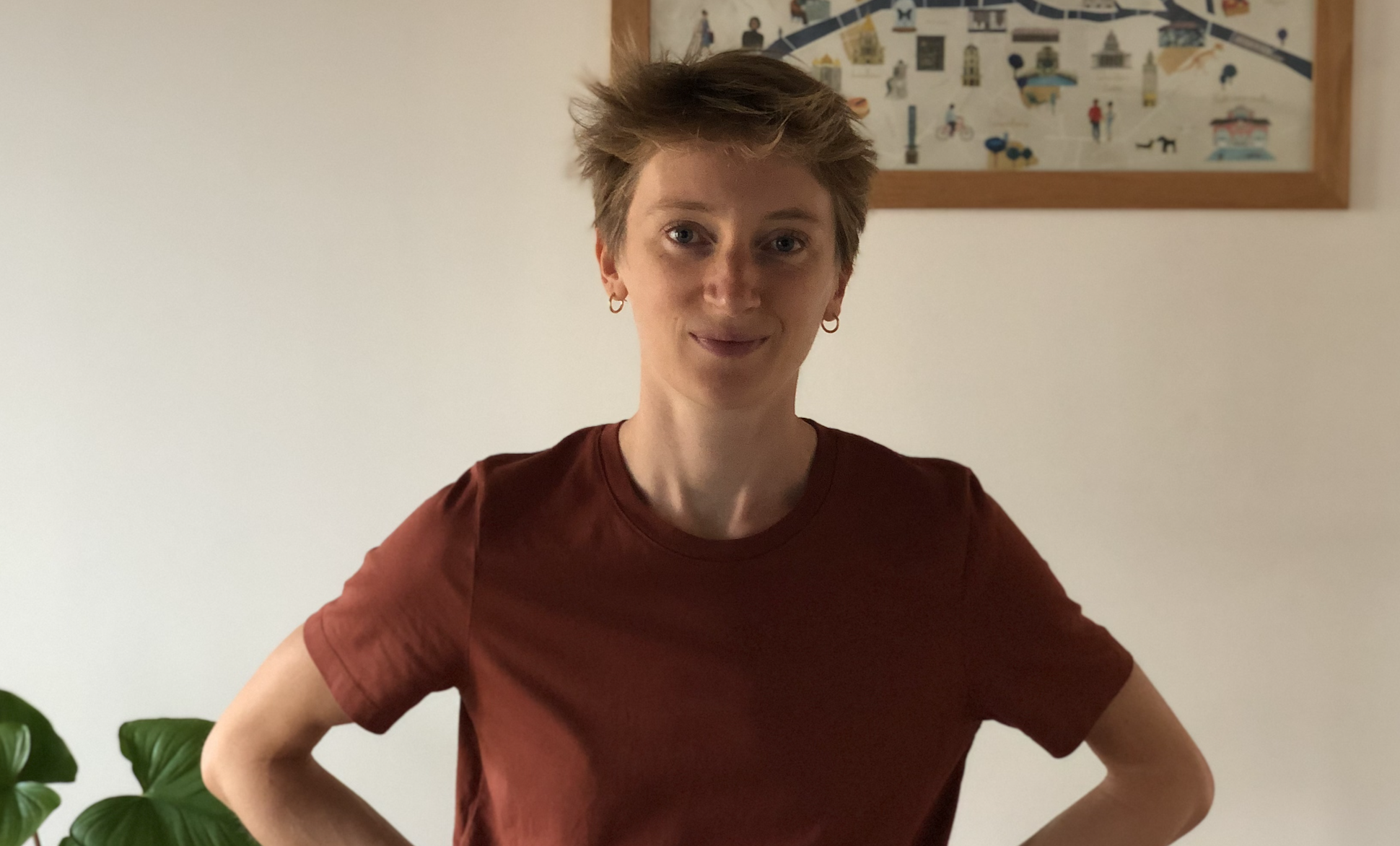
Delphine has left her job at Station F to launch FemTech France
Soon after she was introduced to femtech, Delphine realised how passionate she was about it, so much so that she left her job at Station F and launched FemTech France, an association dedicated to accelerating innovation in women’s health in France.
“Having the right people around you can help you go faster, as an entrepreneur, and can save you time and potentially money,” she explains. “That’s what FemTech France is all about.
“Our aim is to support entrepreneurs by creating synergies between the different actors of the ecosystem and taking part in all the strategic debates around women’s health in France.
“Last year, for example, we did our first bootcamp where we provided eight femtech founders with a toolbox with all the information they needed to create a femtech start-up in France.
“They also had the chance to be connected to our two partners for this first edition, the pharmaceutical lab Organon France and the health insurance Groupe VYV. It was so successful that we are organising it again this year!”
As data on the femtech sector was limited, Delphine and her team also put together the first mapping of the French femtech start-ups, showcasing the work of more than 80 businesses across France.

Delphine and the FemTech France team
“That was another important step for us,” she explains. “We wanted to show that the French ecosystem is booming, is not niche, and that, in fact, there are a lot of actors in this space, but they are still small because they have trouble getting funding.
“What we saw was that most of the femtech start-ups in France focus on reproductive health. However, we lack businesses around menopause and contraception. There’s a huge need, but due to stigma, there isn’t much innovation going on yet.
“In terms of trends, following the national strategy against endometriosis, we saw a lot more people talking openly about endometriosis and more recently, about PCOS.”
Finding a business model in health tech and femtech is also a challenge. Delphine says in France she sees a trend of start-ups shifting from B2C to B2B2C.
“Before Covid it was super taboo to talk about mental health at work. Now, every company offers employee benefits around mental health with applications and services to support employees. I hope in a beautiful future the same will happen for women’s health.”
The good news is that things are changing in France. Women are more open about their health than ever before and, unlike previous generations, they are now willing to speak up and take their health into their own hands.
“We’ve had a positive response from decision makers, ministers and politicians, as most of them are already aware of the gender gap in healthcare,” adds Delphine.
“We are happy to see that their doors are open. This is a public health issue, but if we work together, we can move things forward.”
To find out more, visit femtechfrance.org.
News
HIV research paves way for new ovarian cancer therapies

HIV research has identified a new target for ovarian cancer by selectively blocking a cleft in the retinoblastoma protein that protects tumour-supporting macrophages.
The discovery could make ovarian – and potentially other – cancers more responsive to immunotherapies, treatments that use the body’s immune system to fight disease.
Scientists at the Wistar Institute found that targeting a specific cleft in the retinoblastoma protein removed only tumour-supporting macrophages while sparing those that fight disease.
Macrophages are immune cells that can either attack tumours or shield them from harm.
The work builds on decades of HIV studies led by Dr Luis Montaner, executive vice president of the Wistar Institute and director of its HIV Cure and Viral Diseases Center.
Montaner said: “This target emerged from our work understanding how macrophages survive HIV infection.
“It shows how insights from one field of medicine can inform breakthroughs in another.”
Targeting tumour-protecting macrophages without harming beneficial ones has long been a challenge.
Wistar researchers showed that selectively inhibiting this protein cleft depleted only tumour-supporting macrophages, leaving protective immune cells intact. Animal studies confirmed tumour shrinkage using this approach.
Montaner said: “This is a first-in-kind target against a solid tumour.
“It opens new avenues for therapies that could complement existing immunotherapies.”
The study highlights the value of long-term, cross-disciplinary research. It took more than 10 years from the initial HIV-linked finding to identifying this cancer target.
Next steps include exploring applications in acute myeloid leukaemia, pancreatic cancer and combination therapies.
Diagnosis
US incineration of contraceptives denies 1.4m African women and girls lifesaving care, NGO says
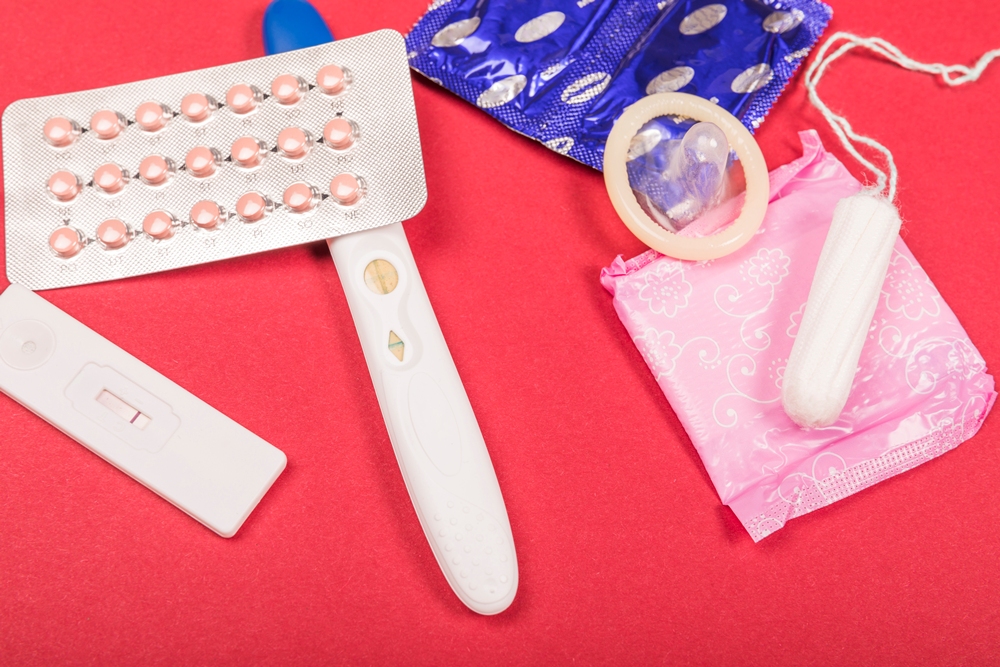
The US decision to incinerate US$9.7m worth of contraceptives is expected to result in 174,000 unintended pregnancies and 56,000 unsafe abortions across five African countries.
The medical supplies, many of which were not due to expire until between 2027 and 2029, would have supported more than 1.4 million women and girls in the Democratic Republic of Congo, Kenya, Tanzania, Zambia and Mali.
The products had already been manufactured, packaged and prepared for delivery. Around 77 per cent were earmarked for distribution in the five African nations.
The International Planned Parenthood Federation (IPPF), a global healthcare provider and advocate for sexual and reproductive rights, offered to take the contraceptives for redistribution at no cost to US taxpayers. The offer was declined.
IPPF said the decision would deny women and girls in the affected countries access to lifesaving care.
Tanzania will be hardest hit, losing more than 1 million injectable doses and 365,100 implants – small devices inserted under the skin that release hormones to prevent pregnancy.
This amounts to 28 per cent of the country’s total annual contraceptive need.
Dr Bakari, project coordinator at Umati, IPPF’s member association in Tanzania, said: “We are facing a major challenge.
“The impact of the USAID funding cuts has already significantly affected the provision of sexual and reproductive health services in Tanzania, leading to a shortage of contraceptive commodities, especially implants.
“This shortage has directly impacted clients’ choices regarding family planning uptake.”
In Mali, women will lose access to 1.2 million oral contraceptive pills and 95,800 implants, nearly one-quarter of the country’s annual requirement.
In Zambia, 48,400 implants and 295,000 injectable doses will no longer be available. In Kenya, 108,000 women will go without contraceptive implants.
Marie Evelyne Petrus-Barry, IPPF’s Africa regional director, called the move “appalling and extremely wasteful”.
She said: “These lifesaving medical supplies were destined to countries where access to reproductive care is already limited, and in some cases, part of a broader humanitarian response, such as in the DRC.
“The choice to incinerate them is unjustifiable.”
In Kenya, the cuts compound an already strained system.
Nelly Munyasia, executive director of the Reproductive Health Network in Kenya, said stocks of long-term contraceptives had already run out, and warned of further consequences.
She said: “There is a 46 per cent funding gap in Kenya’s national family planning programme,.
“These systemic setbacks come at a time when unmet need for contraception remains high. Nearly one in five girls aged 15 to 19 are already pregnant or has given birth.
“Unsafe abortions remain among the five leading causes of maternal deaths in Kenya.”
Munyasia also warned that health workers’ skills are being eroded and said a lack of contraceptive access would increase maternal deaths as more women seek unsafe abortions.
While Kenya’s 2010 constitution allows abortion when a pregnant person’s life or health is at risk, the 1963 penal code still criminalises the procedure.
As a result, healthcare providers often avoid offering abortion care, even in emergencies.
A US state department spokesperson confirmed last month that the decision to destroy the supplies had been authorised.
Reports indicated the products were to be incinerated in France, prompting the French government to say it was “following the situation closely” following objections from rights and family planning groups.
The state department said the contraceptives could not be sold or donated to “eligible buyers” due to US legal restrictions, which prohibit foreign aid to organisations that provide abortion services, counsel on abortion, or advocate for abortion rights overseas.
News
Gates foundation pledges $2.5bn to ‘ignored’ women’s health issues

The Gates Foundation will invest US$2.5bn in women’s health research by 2030, it announced on Monday, focusing on conditions from preeclampsia to menopause.
The pledge is around one-third more than the foundation spent on women’s and maternal health research and development over the past five years.
It is also among the first major commitments since Bill Gates said he would give away his US$200bn fortune by 2045.
Gates said: “Women’s health continues to be ignored, underfunded and sidelined. Too many women still die from preventable causes or live in poor health,” said Gates.
“That must change.”
The new funding will support research into under-studied conditions affecting hundreds of millions of women in both high- and low-income countries.
These include preeclampsia – a pregnancy complication that causes high blood pressure – and gestational diabetes, as well as heavy menstrual bleeding, endometriosis and menopause.
Investment will focus on five priority areas: obstetric care and maternal immunisation; maternal health and nutrition; gynaecological and menstrual health; contraceptive innovation; and research into sexually transmitted infections.
The aim is to kickstart research, develop new products, and ensure equitable global access to treatments.
Just one per cent of healthcare research and innovation spending goes to female-specific conditions beyond cancer, according to a 2021 analysis by McKinsey & Co.
Dr Anita Zaidi, the foundation’s head of gender equality, said the field has been held back by data gaps and bias.
She noted that key questions remain unanswered – including how some medicines interact with the uterus.
She told Reuters: “If you look at the literature, there may be only 10 women who’ve been studied, ever.
“We don’t even have the answers to these basic questions.”
Zaidi said the US$2.5bn pledge is a “drop in the bucket” compared to what is needed, and called on governments, philanthropists and the private sector to step in.
-

 News4 weeks ago
News4 weeks agoDozens of women report suffering painful burns after using Always sanitary towels
-

 News4 weeks ago
News4 weeks agoCutting through the noise in femtech – key takeaways from Women’s Health Week 2025
-

 News3 weeks ago
News3 weeks agoAI embryo selection tool wins European approval
-

 News1 week ago
News1 week agoOpinion: Not ‘just stress’ – How hormonal changes affect women’s brain function
-
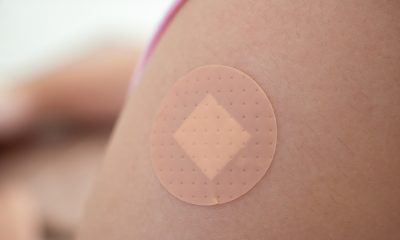
 Menopause3 weeks ago
Menopause3 weeks agoTestosterone patch shows promise for menopausal women
-

 Features3 weeks ago
Features3 weeks agoFrom SEO to GEO: How women’s health brands can get found in the age of AI
-

 Diagnosis2 weeks ago
Diagnosis2 weeks agoTop 7 drug-free solutions for managing PMS and PMDD in in 2025
-

 Hormonal health3 weeks ago
Hormonal health3 weeks agoFDA approves new menopause drug to treat hot flashes and night sweats













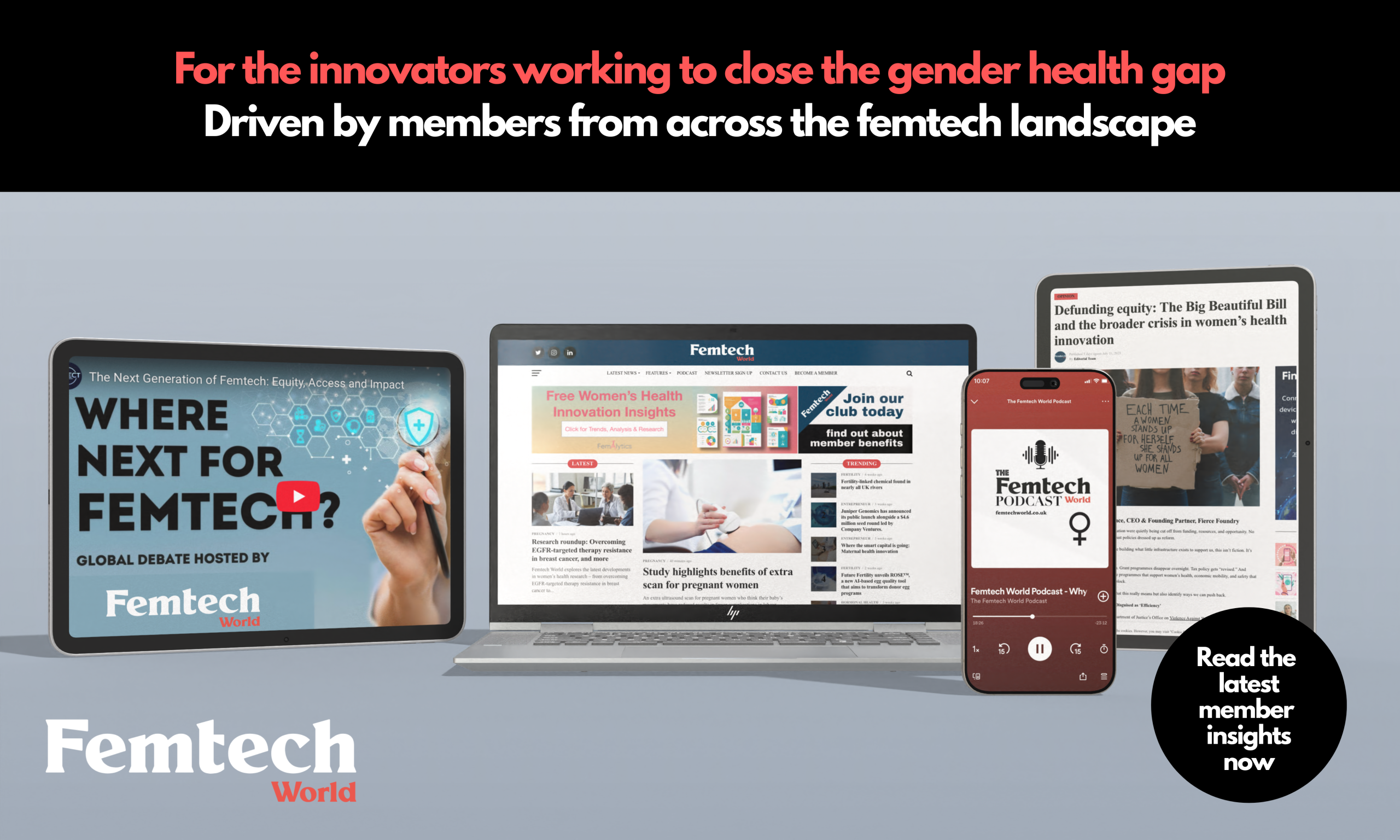












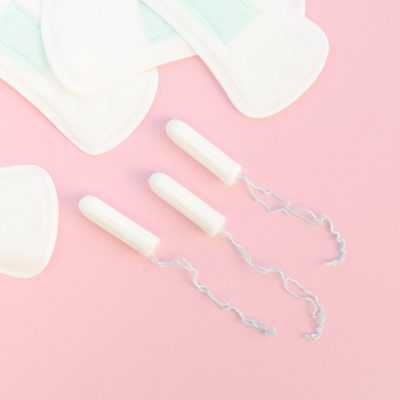

3 Comments